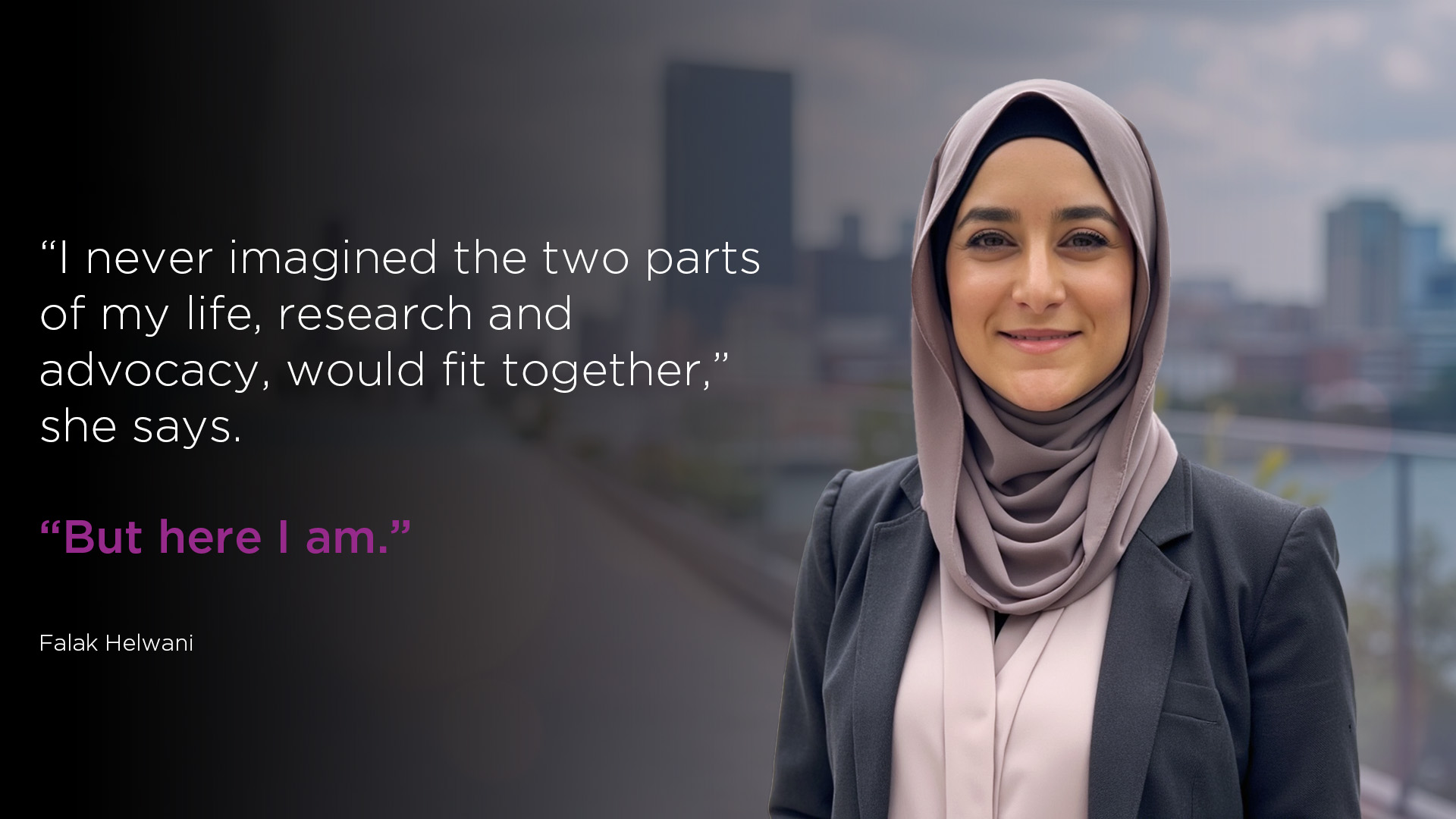Scientist’s unexpected path to advocacy
How Falak Helwani is changing lives with science and story
Falak Helwani didn’t know it at the time, but walking into the Institute for Molecular Bioscience would change everything.
“It really felt like we were stepping into something huge,” she recalls. “From our humble beginnings in the UQ Biological Sciences building to this bright, new, state-of-the-art facility. Suddenly, we were surrounded by brilliant minds, expertise we’d never had access to before, and brand spanking-new equipment. It made you want to come into the lab every day.”
It wasn’t just the science, it was the environment. The newly formed IMB had brought together what had been siloed and scattered around the university. “I think, as a young student, I didn’t fully appreciate the value of that at the time. But looking back, I realise how much that thriving, collaborative space shaped me.”
Falak flourished. She tackled complex experiments, usually juggling several at once, fuelled by caffeine and the infectious energy of the research community. But perhaps the most enduring skill she picked up wasn’t technical.
“Learning at IMB wasn’t just about experiments,” she says. “One of the most valuable things I gained was how to communicate research, beyond the lab, to a wider audience. I was a shocking writer before that. But IMB was where I learned to write well.”
That learning came from both formal and informal mentoring. “I’m so indebted to my supervisor, Professor Alpha Yap, and my peers, people who sat with me, workshopped my writing, and helped me understand how to share knowledge clearly. Two decades later, in my policy and advocacy work, I lean on those skills every day.”
She also points to the mentorship beyond her immediate team as transformative. “Having such easy access to group leaders outside our core team gave me a broader perspective. At the time, I didn’t realise how special that was. But years later, I’m still reaping the benefits of that network.”
Falak’s research journey took an unexpected turn when her daughter was born with a rare congenital heart defect. “There was no more room in my mind for cell culture and mouse models,” she reflects. “I had to step away to care for my child…and later, I found out that another of my children had a different rare disease.”
Suddenly, the abstract became deeply personal.
That lived experience transformed not just Falak’s life, but her career trajectory. She pivoted to freelance science communication, staying close to research through editing and writing. And when a role opened at Rare Voices Australia (RVA), the national peak body for Australians living with rare disease, it felt like a calling.
“I never imagined the two parts of my life, research and advocacy, would fit together,” she says. “But here I am.”
Today, Falak is RVA’s Manager of Research and Evaluation. She helps implement the Australian Government’s National Strategic Action Plan for Rare Diseases, works with researchers across the country, and uses her scientific background to advocate for system-wide change.
“I have this incredible birds-eye view of rare disease research in Australia,” she says. “And I get to help translate that into evidence that drives policy reform.”
In a data-poor space like rare disease, that translation is critical. “There’s very little data, very few treatments. But if we can craft our research and advocacy in ways that align with government priorities, we can push for real, lasting change.”
Falak credits her connection to IMB for helping her find her way back to the research world. “It was that network…the opportunity to work in Dr Carol Wicking’s (Kaz) lab, to build relationships beyond my PhD project…that made all the difference. When I thought my career in science was over, Kaz’s good word got me through the door. It changed everything.”
She’s now helping the next generation, too. RVA’s student placement program, currently exclusively open to IMB students, reflects her belief in giving back. “I know the calibre of students coming out of IMB, and I’m proud to support them. It’s been a huge success.”
Looking back, Falak says it best. “Until you're asked to reflect, you don’t realise how significant that time was. IMB didn’t just teach me how to be a scientist. It taught me how to contribute meaningfully to the world.”
Falak Helwani is proof that a life in science doesn’t always follow a straight path—sometimes, it leads exactly where you're needed most.
